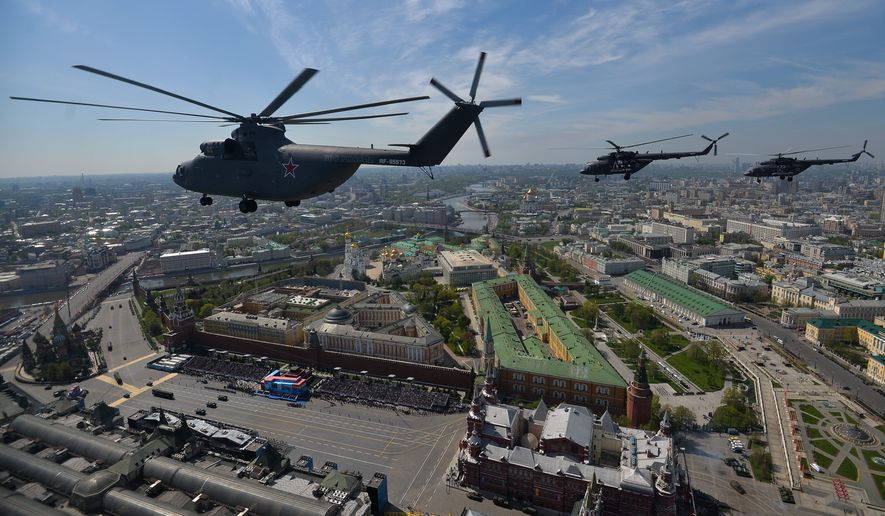Reflecting growing nervousness about recent aggressive moves from Russia, NATO’s three Baltic members — Estonia, Latvia and Lithuania — said Thursday that they will ask the alliance to permanently deploy thousands of ground troops to their nations, prompting a quick and sharp condemnation from Moscow.
NATO officials, gathering for a regular ministerial meeting in Turkey, said they were aware of the request and are open to considering it, but that it is too early to say how the alliance will respond.
But Russia bristled at the news, which comes as Moscow and its western neighbors trade charges of interference and provocative acts fueled by the ongoing clash in Ukraine.
Vladimir Chizhov, Russia’s ambassador to the EU, said the Baltic request was being driven by “local politics” that have blown security concerns out of proportion in the three nations — each of which was part of the Soviet Union during the Cold War.
“Nobody is threatening the Baltics — at least, nobody that I know of,” Mr. Chizhov told reporters in Brussels.
The U.S. did not respond directly to the request, but President Obama has already authorized a small contingency of U.S. troops to be stationed in each of the Baltic states. And U.S. troops and equipment are currently among some 13,000 NATO forces engaged in a major land exercise in Estonia, widely seen as a sign of support and a cautionary message to Russia.
In March the White House authorized the U.S. Army to drive a convoy of some 120 vehicles through the Baltic nations, a military muscle-flexing called “Operation Dragoon Ride” — a historical echo of a similarly named mission that saw Allied forces invade southern France during World War II.
NATO’s current moves in the Baltics are not meant to be permanent though, and the administration has been seen this week to be trying to tamp down tensions with Moscow. Secretary of State John F. Kerry met this week with Russian President Vladimir Putin and Foreign Minister Sergey Lavrov in the Black Sea resort town of Sochi, with Mr. Kerry expressing hope that both sides can “come together and find workable solutions” on various fronts — including in Eastern Europe.
Significant ethnic Russian minority populations live in Estonia, Latvia and Lithuania, where officials say concerns are high that the Kremlin is poised to try and foment pro-Moscow rebellions like the one currently gripping eastern Ukraine.
Mr. Putin declared last year that Moscow has an obligation to protect Russian speakers across the former Soviet states. And U.S. and NATO officials have since blamed the Putin government for pouring weapons and troops into the war between pro-Moscow separatists and Ukraine’s military that has killed more than 6,000 people over the past year.
Russian officials staunchly deny such charges, as well as claims by U.S. officials that Russian military forces have become increasingly brazen during recent months with surprise fighter jet incursions across Western Europe, as well as suspected submarine missions into waters near Helsinki and Stockholm.
On Thursday, British defense officials said two Typhoon fighter jets were scrambled to escort Russian Bear aircraft away from British airspace.
A ’measure of deterrence’
Lithuanian Army spokesman Capt. Mindaugas Neimontas said Thursday that the militaries of Lithuania, Estonia and Latvia are increasingly on edge, seeking the permanent NATO deployment as a “measure of deterrence.”
The goal, Capt. Mindaugas said, would be to have the NATO brigade spread across the Baltics so that a battalion-size unit would be based in each country.
Latvia’s Ministry of Defense also confirmed the request Thursday, asserting in a statement that an official joint letter will be sent to NATO headquarters next week.
“An Allied presence is an essential prerequisite for Latvia’s security in a situation where Russia does not change its policies regarding the Ukraine conflict and, at the same time, strongly demonstrates its military presence and potential in the Baltic Sea region,” the statement said.
At the NATO ministerial meeting in Turkey, meanwhile, NATO Secretary-General Jens Stoltenberg said that it “is too early to comment on details and specifics” of the Baltic request.
“When we receive the letter, we will go carefully through the letter and assess the proposals in that letter,” he said, according to Agence France-Presse.
In a speech earlier this week, the NATO secretary general outlined how navy ships from ten different NATO countries have recently engaged in a large exercise to detect submarines in the North Sea. The operation includes assets from Sweden, which is not a NATO member but is aligned with the alliance and was the target of a suspected Russian military probe last October.
Wary that a Russian submarine was suddenly lurking about 30 miles off the coast of Stockholm at the time, Sweden’s navy engaged in its biggest mobilization in years to try and identify the vessel. The incident set nerves on edge across the region.
In Estonia, over 13,000 troops from eight NATO countries are taking part in a major land exercise. Fighter jets from Poland and other NATO nations have recently established a new rotation standard to provide “air police” around the clock over the Baltic nations.
The Pentagon has maintained a rotating presence of 150 troops in each of the Baltic states and Poland since April 2014, augmented by occasional shifts of similar-size units from other NATO member nations. The alliance, however, could not agree on setting up permanent bases in the region, with some states reportedly viewing such proposals as violations of existing agreements with Moscow.
The Baltic states of Estonia, Latvia and Lithuania, which were annexed by the Soviet Union in 1940, have been members of the European Union and NATO since 2004. Mr. Putin has cited NATO’s post-Cold War expansion right to the borders of Russia as a provocative act that exploited his country’s weakness.
— This article is based in part on wire services reports.
• Guy Taylor can be reached at gtaylor@washingtontimes.com.




Please read our comment policy before commenting.